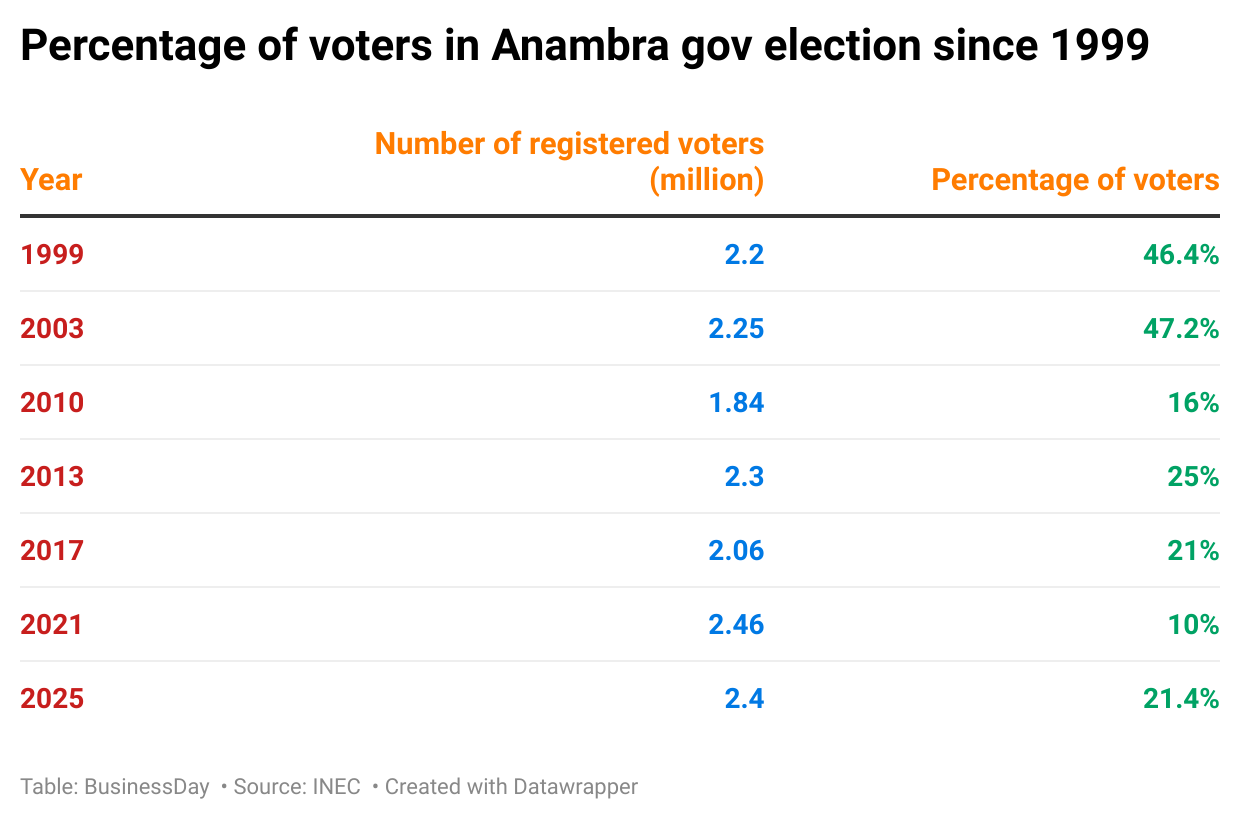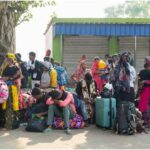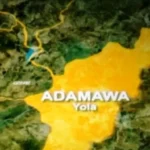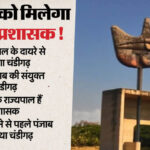Voter participation in the Anambra State gubernatorial elections continues to remain low despite slight improvement in the November 8 elections.
The election was won by All Progressive Grand Alliance (APGA) candidate and incumbent Governor Chukwuma Soludo. Soludo won in all 21 local government areas (LGAs), making him the second person to achieve this in Anambra history, after former governor Willie Obiano in 2017.
But despite his landslide victory in the south-eastern state, the governor's election is a sad reminder of the apathy that has characterized elections in Nigeria and indeed Anambra State in the last two decades.
Data from Nigeria's election umpire, the Independent National Electoral Commission (INEC) and civil society observers shows turnout in the November 8 election was about 21.4% of registered voters.
According to INEC, 16 candidates from 16 political parties ran in the election.
There are a total of 2,788,864 registered voters in the state, of which 598,229 were recognized for the election, representing 21.4 percent participation.
A total of 595,298 votes were cast in the 21 local government areas of the state, while 11,244 votes were rejected.
This figure represents a significant increase from the historical low of approximately 10.3% that was recorded in 2021, with 253,388 of the 2,466,638 registered voters recognized.
Consistent with current trends, experts say the level of engagement remains below democratic expectations. Perhaps, even more worryingly, Anambra State has never achieved 50 percent voter turnout in any of its gubernatorial elections since the return to democratic rule in 1999.
ALSO READ: Why Soludo won Anambra governorship election
“Some local governments in the district, such as Anambra East, Anambra West and Ogbaru, are largely riverine areas and made up of hard-to-reach communities, where the voter-to-polling-unit ratio is higher than other districts,” said Bukola Idowu, executive director of election monitoring group Kimpact Development Initiative.
“These factors have significantly contributed to voter fatigue, disenfranchisement and persistently low turnout in the region”.
Anambra's history of voter apathy
Upon the return to democratic rule in 1999, Anambra State has consistently recorded low voter participation in gubernatorial elections.
Although experts have cited several reasons for this trend, data from observers at the Center for Journalism Innovation and Development (CJID) shows that voter turnout in the Anambra State governorship election has been less than fifty percent.
In 1999, only 1.02 million of the 2.2 million registered voters voted, a turnout of 46.4 percent. The 2003 election saw the highest voter turnout with 47.22 percent.
By 2010, turnout had fallen to 16 percent, with only 302,000 voters out of 1.84 million registered participating. Participation improved slightly in 2013, when 465,891 out of 1.77 million voters voted, representing about 25 percent. Four years later, in 2017, only 448,711 (21 percent) of 2,064,134 voters turned up at polling units.
The decline reached its lowest point in 2021 when only 10 percent of registered voters participated. While the 2025 figure of 21.4 percent marks an improvement, it remains well below democratic expectations.
Election voting across Nigeria
Voter turnout in the gubernatorial election in Anambra on November 8 may be low, but the situation reflects a growing trend of voter apathy across Nigeria.
Over the past two decades, Nigerians' aversion to voting during elections has been well documented and the situation is increasingly becoming a matter of concern to political stakeholders and electoral umpires.
According to Yiaga Africa, national voter turnout has steadily declined from 69 percent in 2003 to just 27 percent in the 2023 general election, the lowest since 1999.
In 2023, only about 25 million valid votes were recorded out of 93 million registered voters. Yiga Africa attributes this decline to a number of factors, including inflated voter registration, poor mobilization, insecurity and declining trust in the electoral process.
The average turnout across 28 states in the 2023 gubernatorial election was 31 percent, but the southeast states had the lowest turnout. Ebonyi recorded the highest turnout in the region at 22 percent, while Abia and Enugu managed only 18 percent.
Northern states fared better than other regions, with four states recording more than 40 percent turnout. In recent elections in Nigeria, including off-season elections, turnout has consistently been below 35 percent.
According to INEC data, some by-elections have recorded participation ranging from three to eight percent. In the 2024 governorship election in Edo, only 25.9 percent of registered voters who collected their PVCs participated. Ondo elections in 2020 recorded a voter turnout of 32.8 percent.
The 2023 figure was a decline of 8.03 percent from the 2019 general election, in which turnout was 34.74 percent.
Data from the election management body shows that Nigeria's voter turnout has been declining almost every year since 2007.
Also read: How Anambra polls defined Amupitan's job
Security concerns, credibility of elections
Experts say that the legitimacy of emerging governments in a democratic political system depends on the extent to which eligible voters come out to vote for them during elections.
The persistent trend of voter apathy in the Anambra governorship election remains a matter of concern for proponents of democracy and its survival in the country.
But observers say security concerns remain a major factor in the low turnout in the Anambra gubernatorial election on November 8.
They attribute the low participation to the IPOB-led stay-at-home orders and general insecurity across the state.
Political scientist Kunde Okunade said many parts of the state still remain unsafe and unstable, noting that this may have contributed to the low turnout.
According to him, insecurity is still an issue in Anambra State, the capital may be safe but there are still cases of kidnapping and other crimes in many remote villages and communities.
He said, “People in the villages are afraid to go out, some people came out, the security there is not as tight as it is in big cities.”
Similarly, Sylvester Odion Akhine, a professor of political science at Lagos State University (LASU), said the fear of militarization and violence in the governorship election may have affected voter turnout.
“People were scared because of the insecurity and militarization of the elections and you can't blame them,” the political scientist said.
Similarly, Tunde Odeyemi, an election observer and civil society activist who monitored the Anambra governorship election, told BusinessDay that many citizens abstained from voting due to past experience, fearing that their votes would not be counted.
He noted that citizens have lost trust in electoral umpires to conduct credible voting and questioned whether elections lead to any substantive improvement in governance.











